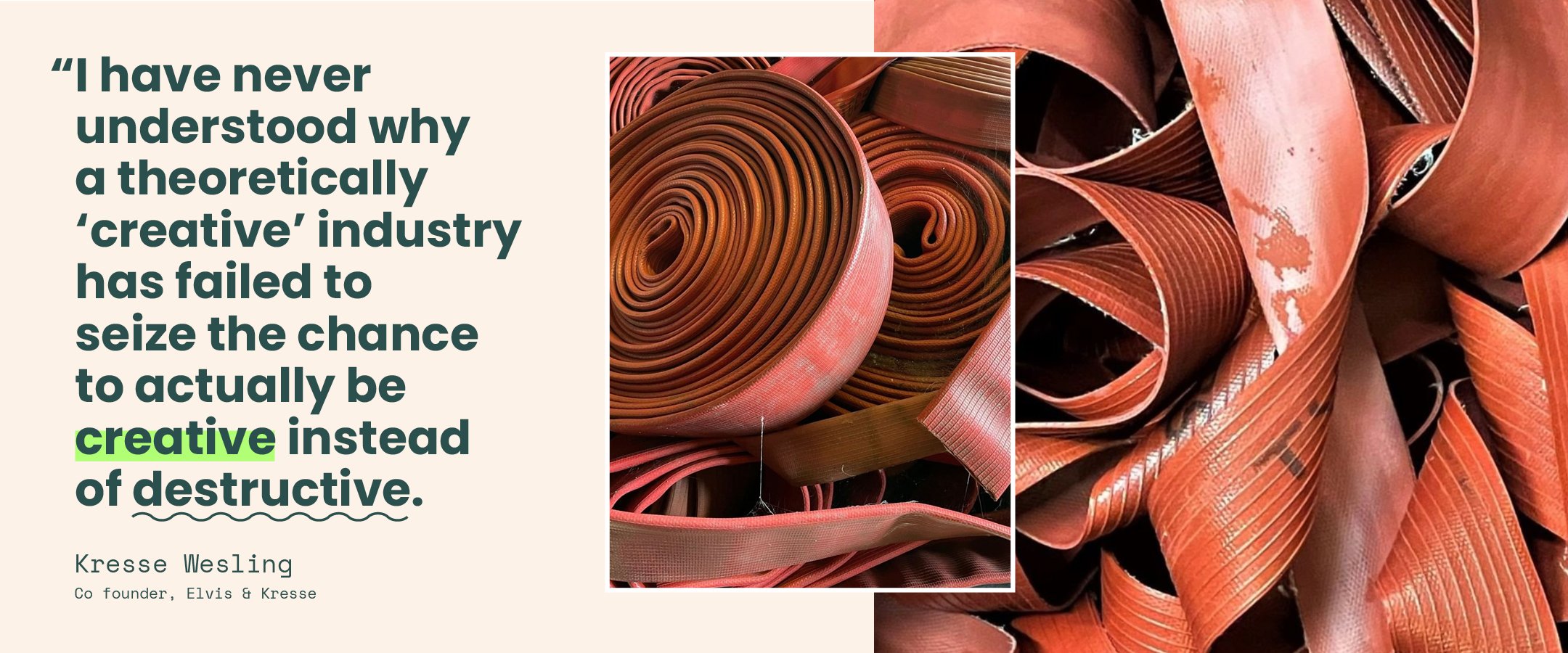‘THE PIONEER in 5’ with Kresse Wesling, co-Founder, Elvis & Kresse
Kresse Wesling, Co-Founder of Elvis & Kresse, the luxury apparel brand made from repurposed materials, and Co-Farmer of New Barns Farm, shares her ‘Pioneer in 5’ with us below. She shines a light on what a regenerative fashion business means to her, how moving her business and home to a Farm in Kent has created new opportunities, and how she would like to see the fashion industry step up as a ‘creator’ rather than a ‘destroyer’ in its relationship to nature and biodiversity.
1. Elvis & Kresse has made a commitment to be “net regenerative” as well as “net zero” by 2030. What does that mean and entail for you as a business?
Net zero is something of a marker for us, it is a waypoint that we will travel through on a journey which will never end. When we started in 2005 we had one specific goal, keeping London's hoses out of landfill. But over time our ambition has grown. We want to demonstrate that a company can be an ever expanding maker of positive impact on society and the environment. In short, just how good can a good company be if it sees no limit. To be net regenerative we have to give more to the planet and its people than we take and we have to do this to cover everything the business has done, and will do. We can't give more than we take today, we have to design everything we do to ensure that we deliver a net gain for everyone, forever.
2. What opportunities does running your own farm in Kent, ‘New Barns Farm’, present for you as a business to generate positive biodiversity and climate outcomes, and drive business benefits?
Despite being a small farm the opportunities are endless. Although our main crop will be grapes, and we hope to make our first wine here in 2025, that is really just a part of the story. We are planting close to 3000 trees, a hugely diverse mix chosen for biodiversity, habitat creation and yields (fruits, nuts, flowers). We have a flock of sheep and are practising holistic, planned grazing. We built the most beautiful sewage treatment system in the world. We will not ever use any 'cides' or 'izers' but will instead use compost (which we make ourselves) and compost teas and deploy a strategy of abundance. We will have bees, aquaculture, a market garden, a strawbale workshop, a winery, a test kitchen, our solar forge and who knows what else! We will be able to host people from far and wide and share everything that we learn, success or failure. Our business will benefit from being here because it is at the heart of the farm, we are designing the site to run in symbiosis with the business, our team and our lives too.
3. How has moving Elvis & Kresse’s business operations to your own farm changed your view on the relationship between fashion and nature? What opportunities and benefits have emerged?
Moving here hasn't changed our views, we came here to better live up to values that we have long held. Nature is at the top of our pyramid of priorities, fashion shouldn't exist unless it is in the service of nature (and that includes people). We have been searching for a farm for years because we wanted Elvis & Kresse to be based in nature and be in a position to generate its own energy, treat its own sewage, work on regenerative agriculture projects and build-in as much biodiversity as possible. Despite this, there are definitely opportunities that we never would have imagined and I am sure that these will continue to present themselves through time. The farm is a fantastic place to launch collaborations with other farmers, social enterprises, B Corps, schools, universities, NGOs; it has the potential to become a real hub. Perhaps the most exciting aspect of working in nature is that it changes, it is constantly presenting challenges, solutions and inspiration.
4. What is the biggest missed opportunity you are seeing right now in the fashion industry, and how could it be addressed differently?
The biggest missed opportunity is to operate as if everyone in your supply chain was a family member or a friend, and as if every ecosystem you interacted with was your own backyard. Wherever there is the most damage, there will also be the most ground to make up, which means the best potential for change. I have never understood why a theoretically 'creative' industry has failed to seize the chance to actually be creative instead of destructive. Kindness, transparency, problem solving, regeneration... these represent infinite opportunities.
5. How are you personally inspired by nature?
Nature inspires everything. My favourite museum in London, and this is tough as we have a piece in the V&A's permanent collection, is the Natural History Museum. No matter what we have designed, as a species, it just doesn't compare with what you can find in the great outdoors. I was lucky, I had an amazing childhood filled with camping trips in Western Canada. I was on a short hike with my Dad once and we came so breathtakingly close to a Moose and her calf. I have had so many moments like these. They are the debts I can never repay, they are the driving force behind everything we do.
👉🏼 Sign up here to receive our fortnightly ‘Wonder Letter’ — for opportunities, interviews and insights on how business and people can ‘grow better with nature’. For pioneering leaders brands, change-makers and communicators passionate about creating positive impact for people and planet.



